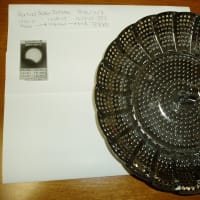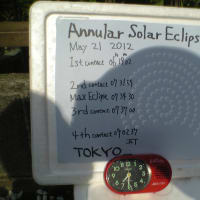IAU=国際天文学連合(こくさいてんもんがくれんごう<The International Astronomical Union (IAU)>)会員名簿: Kevin K.C. Yau
JPLの1988年のリリース: jpl.nasa.gov/news/releases/80s/release_1988_1208.html
Analyzing ancient Chinese accounts of solar eclipses up to nearly 4,000 years old, Jet Propulsion Laboratory researchers have determined to within few thousandths of second the rate at which the Earth's daily rotation has been gradually slowing down.
~我らのYau博士は、当時は英国の大学に在籍中だった?
2002年5月の「惑星直列」について: 2002年5月13日の太陽系(太陽~木星)の様子
universetoday/2002/05/12/new-planetary-show-on-monday/
~一般向け広報でもご活躍・・・
space.com/Moon Snuggles With Planets This Week 13 May 2002
古代からの5惑星集合について語るYau先生:
Astronomers call these close passes of planets "conjunctions," and records on similar events go back 3,500 years. JPL astronomer Kevin Yau has studied ancient Chinese astronomy texts to learn more about them.
"The Han Dynasty came to power in 605 BC," Yau said. "One year later astronomers saw a five-planet conjunction gathered in the constellation Dongjing -- what we would call Gemini."
This led to the ancient Chinese belief that the conjunction was an omen of change, but alignments have no effect on Earth, Yau said. Some 40 similar conjunctions involving five planets may have been seen between 2000 BC and AD 2000, Yau calculates.
"Today, we are grateful that such detailed observational records were kept," Yau said. "Our modern astronomical database goes back about five hundred years, which is relatively short in terms of astronomical time scales."
(BC605年云々というのが、ちょっと分からない。206年じゃね?…)
それはさておき、写真がないものか?と捜すと:
集合写真だけど、この中にご登場: Awards for Excellence - 2002 (個人表彰の次の、「チームの部」の最初のチームね)
Exceptional Technical Excellence
Cassini Jupiter Encounter
For significant achievement in the planning, development and execution of
the science observation sequence for the Cassini Jupiter flyby.
えーと、カッシーニ=ホイヘンス計画で、(木星フライバイの計画・実行にあたり)技術上の貢献度が大であったことに対して年間優秀表彰を受けたチームのメンバー、ってわけね。
ゴ~ウです: alc/conjunction=合 ~5番目ね。
wiki/合(ごう、conjunction)
古天文の部屋
あ"~興味深い!!
まだつづく
JPLの1988年のリリース: jpl.nasa.gov/news/releases/80s/release_1988_1208.html
Analyzing ancient Chinese accounts of solar eclipses up to nearly 4,000 years old, Jet Propulsion Laboratory researchers have determined to within few thousandths of second the rate at which the Earth's daily rotation has been gradually slowing down.
~我らのYau博士は、当時は英国の大学に在籍中だった?
2002年5月の「惑星直列」について: 2002年5月13日の太陽系(太陽~木星)の様子
universetoday/2002/05/12/new-planetary-show-on-monday/
~一般向け広報でもご活躍・・・
space.com/Moon Snuggles With Planets This Week 13 May 2002
古代からの5惑星集合について語るYau先生:
Astronomers call these close passes of planets "conjunctions," and records on similar events go back 3,500 years. JPL astronomer Kevin Yau has studied ancient Chinese astronomy texts to learn more about them.
"The Han Dynasty came to power in 605 BC," Yau said. "One year later astronomers saw a five-planet conjunction gathered in the constellation Dongjing -- what we would call Gemini."
This led to the ancient Chinese belief that the conjunction was an omen of change, but alignments have no effect on Earth, Yau said. Some 40 similar conjunctions involving five planets may have been seen between 2000 BC and AD 2000, Yau calculates.
"Today, we are grateful that such detailed observational records were kept," Yau said. "Our modern astronomical database goes back about five hundred years, which is relatively short in terms of astronomical time scales."
(BC605年云々というのが、ちょっと分からない。206年じゃね?…)
それはさておき、写真がないものか?と捜すと:
集合写真だけど、この中にご登場: Awards for Excellence - 2002 (個人表彰の次の、「チームの部」の最初のチームね)
Exceptional Technical Excellence
Cassini Jupiter Encounter
For significant achievement in the planning, development and execution of
the science observation sequence for the Cassini Jupiter flyby.
えーと、カッシーニ=ホイヘンス計画で、(木星フライバイの計画・実行にあたり)技術上の貢献度が大であったことに対して年間優秀表彰を受けたチームのメンバー、ってわけね。
ゴ~ウです: alc/conjunction=合 ~5番目ね。
wiki/合(ごう、conjunction)
古天文の部屋
あ"~興味深い!!
まだつづく

























